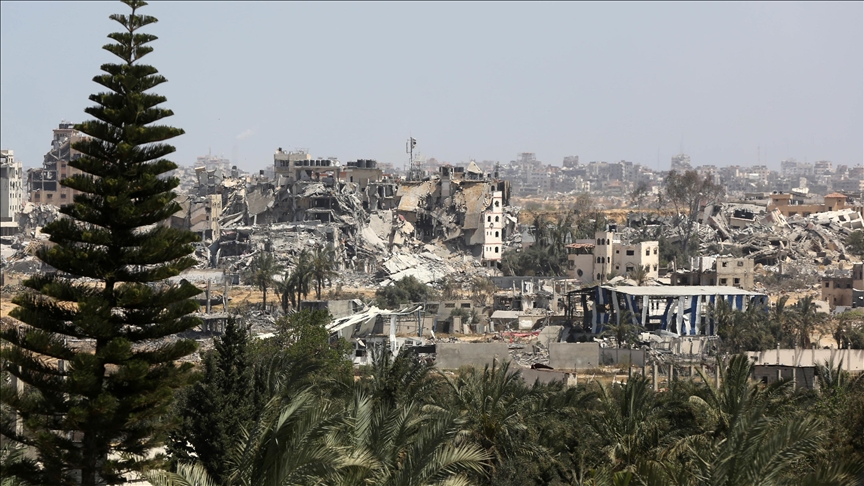Israel pursues political, military goals by building divisive corridors in Gaza
Palestinians say corridors deepen Israeli occupation, change historical nature of Gaza Strip

ISTANBUL
As Israel continues its brutal attacks on the Gaza Strip, the new corridors it is building as part of its policy of dividing Gaza are changing the geographical structure and fabric of Palestinian lands.
Israel has built military roads such as the Netzarim Corridor, the Philadelphi Corridor and the David Corridor, separating the cities from each other in order to divide the Gaza Strip, change its geographical structure, confiscate Palestinian lands and turn them into projects that will serve its military and political goals.
Palestinians say that with such projects Israelis deepen the occupation, change the historical nature of Gaza and make it harder for displaced Gazans to return to their homes.
Netzarim Corridor
The seven-kilometer-long (4.3-mile-long) Netzarim Corridor, which separates the north from the south of the Gaza Strip, is considered one of the most dangerous roads built by Israel in the recent period.
Hosni Muhenna, the coordinator of the Union of Gaza Municipalities, said in a statement to Anadolu that the roads built by Israel in the Gaza Strip, “confiscated large agricultural areas and destroyed large settlements on both sides of the road to create the Netzarim Corridor.”
Muhenna said that the Israeli army established two military checkpoints, one at the intersection with Salah al-Din Street in the east and the other at the intersection with Al-Rashid Street, noting that displaced Palestinians fleeing hunger, thirst and brutal Israeli attacks are forced to pass through these military checkpoints.
He said that the Israeli army is trying to change the historical structure of the cities in the Gaza Strip by building these roads with military and political objectives, and that Israel is pursuing a policy of psychologically destroying the Palestinians and destroying their hopes of reclaiming their lands and living in security and stability.
On condition of anonymity, a Palestinian youth, who was displaced from the north to the south of Gaza two months ago, described his experience of passing through the Netzarim checkpoint on Al-Rashid Street.
“It was horrible. I was detained without explanation and held for hours, with soldiers hiding behind cement cubes and armored vehicles. I felt like I was in a closed war zone. There were a lot of soldiers and armored vehicles. Anyone who tries to pass through there is constantly facing death. You feel that your chances of survival are very slim.”
Riyad Shamlah, one of the Palestinian farmers whose land was confiscated during the construction of the corridor, said: “Israeli forces took our land for the Netzarim Corridor. The occupiers confiscated hundreds of acres of land with vines and fig trees, where various vegetables were planted, and completely plundered them.”
Philadelphi Corridor
The 14-kilometer-long (8.7-mile-long) Philadelphi Corridor between the Gaza Strip and Egypt is the most prominent border road that Israel has used to isolate the Gaza Strip from the outside world since it occupied the Rafah border crossing.
The Israeli army claims that it controls the Philadelphi Corridor because of the presence of tunnels that it claims are used to smuggle weapons into the Gaza Strip.
Cairo, on the other hand, denies Tel Aviv's claims, saying it demolished hundreds of tunnels on the Egyptian side of the border years ago and built a military buffer zone to prevent smuggling.
The Philadelphi Corridor largely reflects Israel's strategy of citing security reasons to justify its geographical expansion and further restrictions on the Palestinians.
David Corridor
The David Corridor, which runs from the Kerem Abu Salim crossing to Salah al-Din Street, is another road that Israel is building further inland, parallel to the Philadelphi Corridor, to completely isolate southern Gaza from Egypt.
In order to build this corridor, hundreds of houses inside Gaza were demolished, thousands of Palestinians were left homeless, and families who had lived on the land for decades were displaced.
Mahmoud Ahmed, a Palestinian farmer whose farmland east of Rafah city was confiscated while the road was being built, said he was extremely saddened by the loss of his livelihood.
“My land was my only asset. The Israeli army not only plundered our land, but also ruined the lives of many families whose main source of income is agriculture.” Ahmed said.
Rami Abduh, head of the Gaza branch of the Euro-Mediterranean Human Rights Monitor, said that Israel's actions are part of its policy of annexing Palestinian land and expelling its residents.
“Israel's construction of these roads is part of a larger plan to change the geographic and demographic structure of the Gaza Strip,” Abduh said.
“The main goal behind these policies is to evacuate the area from its original inhabitants and impose a new reality on the ground that coincides with Israel's long-term plans,” Abduh said, adding that this policy is not a temporary military measure and that Israel aims to keep the territory under its permanent control.
Israel's insistence on maintaining control of the Philadelphi Corridor, the Egyptian-Gaza borderline, and the Netzarim Corridor, which separates the north from the south of the Gaza Strip, are among the main issues that have complicated peace negotiations.
The Egyptian government also opposes Israel's presence at the Rafah border crossing or the Philadelphi Corridor, saying it would harm its “national security.”
*Writing by Efe Ozkan
Anadolu Agency website contains only a portion of the news stories offered to subscribers in the AA News Broadcasting System (HAS), and in summarized form. Please contact us for subscription options.







